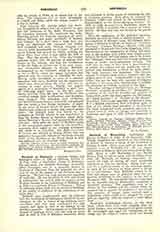

Berthold of Ohiemsee, a German bishop and theological writer, b. 1465 at Salzburg, Austria; d. July 19, 1543, at Saalfelden (duchy of Salzburg). His real name was Berthold Pürstinger, frequently called Pirstinger; but he is generally known as Berthold of Chiemsee, from his episcopal see, situated on one of the islands of the Bavarian lake of Chiemsee. We have but little information regarding his early life. He was licentiate in civil, and doctor in ecclesiastical law, and in 1495 he appears as the Magister Camerae of the Archbishop of Salzburg, and in 1508 was appointed Bishop of Chiemsee. During his episcopal career (1508-25), he resided at Salzburg, in the quality of coadjutor to the archbishop of the latter place.
Berthold twice conspicuously used his influence with the Archbishop of Salzburg in behalf of the unfortunate: in 1511 in favor of the Salzburg town-councillors who had been condemned for high treason, and again in 1524 in the interest of the rebellious peasants. He was present at the Provincial Council of Salzburg (1512), and also took an active part in 1522 in that of Muhldorf (Bavaria), which was convened to devise means of stemming the tide of Lutheran progress. Soon after, he resigned his bishopric (1526) and retired to the monastery of Raitenhaslach on the Austro-Bavarian frontier. In 1528, or 1529, he removed to Saalfelden, where he founded (1533) a hospital with a church for infirm priests. He died here and was buried in the parish church.
After his resignation of his episcopal functions Berthold devoted his time to literary pursuits. At the suggestion of Matthew Lang, the Cardinal Archbishop of Salzburg (1519-40), he wrote his “Tewtsche Theologey” (German Theology—Munich, 1528) and translated it afterwards into Latin (Augsburg, 1531). Earnestness in the suppression of abuses and mildness in his dealings with others were characteristic traits of Berthold, and they appear also in his works; his “Theology” does not bear the bitterly polemical stamp of similar contemporaneous writings. The work does not seem to have been in great demand, as neither the original nor the translation was reprinted until Reithmeier reedited the work (1852). The book, however, was important. The German original is valuable from both a linguistic and theological point of view. Linguistically, it proves that Luther was not the only able exponent of religious doctrines in the vernacular; theologically, it exhibits the character of Catholic teaching at the time.
The other writings of Berthold were: (I) “Tewtsch Rational”, a treatise on the Mass; (2) “Keligpuchel”, a defense of the Catholic doctrine and practice of Communion under one kind, against the Reformers; (3) “Onus Ecclesiae” or “Burden of the Church” (Landshut, 1524) is also generally attributed to him. It is a fearless exposition, from a Catholic point of view, of the abuses then prevalent in the Church. The book occasioned much comment and was reprinted twice in 1531, at Cologne and probably at Augsburg, and again in 1620 without indication of place.
N. A. WEBER

